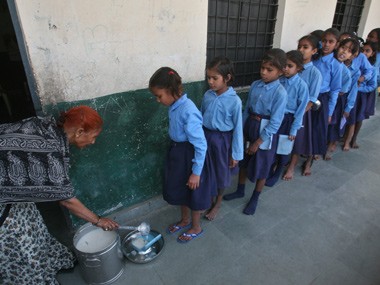
A recent survey has revealed that the quality and standard of education in the rural parts of India has dropped drastically.
The Annual Status of Education Report (Rural) 2012 prepared by Pratham, a non-governmental organisation which works to provide quality education to underprivileged children, was released on Thursday by Union HRD Minister MM Pallam Raju.
The report has raised concern over the effectiveness of the Right to Education Act (RTE) which came into effect from April 1, 2010. The Act was aimed at imparting free and compulsory education to children aged between six and 14 in India under Article 21a of the Indian constitution.
The report stated that the basic learning skills declined among rural children in 2012 adding that only five out of 10 students of grade five could solve simple arithmetic problems.
The NGO's report also mentioned a fall in the reading ability of children especially those in government schools. It was said that parents in rural India preferred private schools over government schools to educate their children. A fall was noted in the enrolment of girls in schools
According to the data, about 45 percent of students were enrolled in private schools last year from class I-VIII. The survey was carried out on six lakh children between the ages 3-16 from 567 rural districts in the country.
The data showed that except for some states like Andhra Pradesh, Karnataka and Kerala all other major states have reported a declining trend in arithmetic learning skills among students.
Expressing his concern over the report, Union Minister MM Pallam Raju said, "We have been spending a lot of money on improving the reach of schools. All these are interventions. We are not unduly alarmed by parents sending their children to private schools, want to focus on improving standards in government schools."
The survey in-charge, Dr Rukmini Banerji said, "It's how you look at the way forward. The last couple of years have seen a big decline and that is very worrying. We have spent many years getting our children into school, now it is time to see what we learn from them," NDTV reported.
The report criticizes the Right to Education Act and holds it responsible for the poor standard of education in rural India.
It attributed the fall in the level of education to Continuous Comprehensive Evaluation (CCE) introduced by RTE, wherein the system of examinations and assessments was withdrawn up to few classes to reduce pressure on children. It also took into consideration the student's co-curricular activities in addition to the curricular.
Raju denied the claim but said that he was approached by parents to remove the CCE mode of assessment. He defended the move asserting that the primary aim of RTE was to enroll more number of children into schools and that the focus would now be the quality of education.
Yogendra Yadav, a social scientist, supported the move blaming poor staff recruitment and teaching standards for the decline in quality education.
On a positive note, an improvement was observed in the development of school infrastructure and Pupil-Teacher ratio across the nation.

















